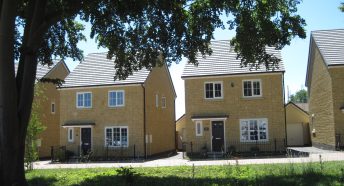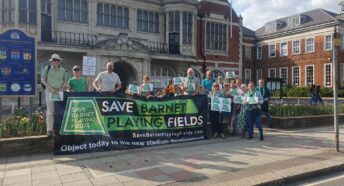We're back! CPRE has a Thanet committee again

Thanet has a CPRE district committee again.
Sixteen people were at Monkton nature reserve on Monday afternoon (October 23) to take part in the welcome – and long overdue – revival of a committee for the isle, the only CPRE district in the county not to have been regularly represented in recent years despite having some 60 members.
David Morrish, the newly-elected chairman, gave the reasons for looking to reinstate the committee, noting how the community’s approach to planning proposals had previously been “too disjointed and piecemeal”.
He said that parish and town councils had failed to represent their electorate’s views, citing the outline planning application at Salmestone as “a blatant example” of this.
Geoff Orton, who will be district secretary, told the meeting that almost three years ago a meeting in Pierremont Hall, Broadstairs, had been addressed by CPRE Kent director Hilary Newport and senior planner Brian Lloyd, expressing reservations about Thanet’s ability to cope with a then-target of some 12,000 new houses. Now, with new planning methodology in the pipeline, that figure was likely to be close to a staggering 24,000.
If ever Thanet needed a strong CPRE presence, it is clearly now!
Other officers to be voted in were Suzanne Brimm as vice-chair and Colin Bridge as treasurer, while Peter Lorenzo, Alan Gimes, Craig Solly, Mrs M Bawden, Bernard Clayson, Natasha Ransom, Beth Johnson and Sonya Smyth all agreed to stand on the committee, meaning CPRE Thanet had a healthy coverage across the isle.
Finally, it was agreed that in principle Thanet CPRE should aim to meet on the last Monday of every month and, to accommodate as many people as possible, at 6pm. This, of course, might be subject to change on occasion.
Thanet Countryside Trust, which owns Monkton nature reserve, was thanked for its hospitality.
The date of the next meeting, again at Monkton nature reserve, is Monday, November 27, at 6pm.
Friday, October 27, 2017
- A number of important documents have yet to emerge. For example, a rigorous transport plan and a finalised air-quality assessment. The latter is critical given that allocations at Teynham will feed extra traffic into AQMAs.
- There seems to be no coherent plan for infrastructure delivery – a key component of the plan given the allocations being proposed near the already crowded Junction 7.
- There seems to have been little or no cooperation with neighbouring boroughs or even parish councils within Swale itself.
The removal of a second consultation might have been understandable if this final version of the plan were similar to that being talked about at the beginning of the consultation process. It is, however, radically different in the following ways:
- There has been a major shift in the balance of housing allocations, away from the west of the borough over to the east, especially around the historic town of Faversham. This is a move that raises many concerns.
- A new large allocation, with accompanying A2 bypass, has appeared around Teynham and Lynsted, to which we are objecting.
- Housing allocations in the AONB around Neames Forstal that were judged “unsuitable” by the council’s own officers have now appeared as part of the housing numbers.
- Most of the housing allocations being proposed are on greenfield sites, many of them on Grade 1 agricultural land – a point to which we are strongly objecting.
Concerns about the rush to submit the plan
The haste with which the plan is being prepared is especially worrying given the concentration of housing in Faversham. If the town is to take a large amount of new housing, it is imperative that the policies concerning the area are carefully worked out to preserve, as far as possible, the unique nature of the town. The rush to submit the plan is likely to prove detrimental.
As Swale does not have a five-year land housing supply, it is open to speculative development proposals, many of which would run counter to the ideas contained in the current plan. Some are already appearing. This is a common situation, and one that, doubtless, is a reason behind Swale’s haste.
Our overriding fear, however, is that this emphasis on haste is ultimately going to prove counterproductive. This is because it is our view that the plan, in its current form, is unlikely to pass independent examination. We are urging Swale to listen to and act upon the comments being made about the plan and to return the plan to the council with appropriate modifications before submitting it to the Secretary of State.
Essentially, this means treating the current consultation not as the final one but as the ‘lost’ second consultation.
The consultation ends on Friday 30 April and we strongly urge residents to make their opinions known if they have not already done so.
Further information








